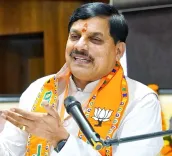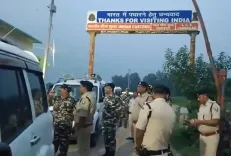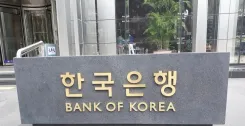Did Harish Rao Respond to All Inquiries by the Ghose Commission Regarding the Kaleshwaram Project?

Synopsis
Key Takeaways
- T. Harish Rao testified before the Ghose Commission on project irregularities.
- The project design was altered due to objections from Maharashtra and the CWC.
- Kaleshwaram Corporation was formed for project financing.
- The Commission is headed by retired Supreme Court judge Pinaki Chandra Ghose.
- Over 100 officials have been examined by the Commission so far.
Hyderabad, June 9 (NationPress) - T. Harish Rao, a prominent leader of the Bharat Rashtra Samithi (BRS) and former Minister, testified before the PC Ghose Commission on Monday. This Commission is examining the alleged discrepancies associated with the Kaleshwaram lift irrigation project, and Harish Rao confirmed that he addressed all inquiries posed by the Commission.
The interrogation lasted approximately 40 minutes at BRK Bhavan. Following the session, he briefed the media, elaborating on the reasons behind the project's redesign. Harish Rao showcased the project layout to clarify its various components.
He informed the Commission that modifications to the project were necessitated by objections from both Maharashtra and the Central Water Commission (CWC). The project's site was shifted from Thummidihatti to Medigadda after a comprehensive survey due to water availability challenges.
When questioned about Medigadda, Annaram, and Sundilla, the BRS leader stated that the Cabinet sanctioned the construction of all barrages. Adjustments to the designs of the Annaram and Sundilla barrages were made following engineers' recommendations.
Harish Rao underscored that the Kaleshwaram Corporation was established to secure project financing. This Corporation received Cabinet approval and government guarantees, allowing loans to be acquired from central government institutions and banks.
The former Minister indicated that he answered all inquiries and presented supporting evidence. He noted that the majority of questions centered on the shift in location from Thummidihatti to Medigadda, emphasizing the government's commitment to developing the project at Tummidihatti and detailing discussions with the Maharashtra government.
After his appearance, Harish Rao visited the residence of BRS president and former Chief Minister K. Chandrasekhar Rao (KCR), who is scheduled to appear before the Commission on June 11.
Harish Rao arrived at BRK Bhavan in a convoy from the BRS headquarters, Telangana Bhavan, where a substantial number of party leaders and supporters gathered to show their support.
BRS working president K. T. Rama Rao met with Harish Rao to express solidarity ahead of his appearance.
Harish Rao served as the Irrigation Minister from 2014 to 2018 during the construction of the lift irrigation project across the Godavari River by the BRS government.
He is the second leader to testify before the Commission, following BJP MP and former Minister Eatala Rajender, who appeared on June 6.
Rajender, who was Finance Minister from 2014 to 2018, distanced himself from the Kaleshwaram project execution, asserting that all construction and financial decisions were under the Irrigation Department's jurisdiction.
Rajender was previously Health Minister during BRS' second term (2018-2023) but parted ways with the party, joining BJP in 2021 after KCR removed him from the Cabinet amid land grabbing allegations.
The Ghose Commission has also summoned KCR. Although he was directed to appear on June 5, he requested a postponement to June 11.
Headed by retired Supreme Court judge Pinaki Chandra Ghose, the Commission is investigating the alleged irregularities in the planning, design, construction, quality control, operation, and maintenance of the Medigadda, Annaram, and Sundilla Barrages associated with the Kaleshwaram project.
This one-man Commission was established in March 2024 following the collapse of several piers at the Medigadda Barrage.
Its term has been extended multiple times, with the initial term concluding on June 30, 2024.
Notices were issued to KCR, Harish Rao, and Rajender just a day after the state government prolonged the Commission's term by two months, until July 31, to facilitate the examination of all involved parties.
To date, the Commission has interviewed over 100 engineers and both retired and active officials linked to the barrages among others.







